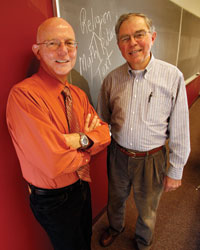Globalization meets God in CC’s religion department these days. Once based on a “seminary model” centered on Judeo-Christian traditions, the department now offers regular classes in Buddhism and Hinduism; the department hopes to add a faculty member focusing on Islam. Professors Sam Williams and David Weddle have been watching this trend, and they like what’s happening.
Q: When you take the global view of religion, what do you see? And what do you learn?
Weddle: You learn that the major religious traditions of the world have always developed in creative interaction with one another. Buddhism emerged as a reform movement within Hinduism, Christianity began as a messianic form of Judaism, and so on. This trend greatly accelerates under conditions of global communication, trade, immigration, and political networks. No primary component of a culture is isolated from its counterpart in other cultures, and that includes religion. You also learn that, unlike prevailing views among the educated elite in Europe and North America, most of our fellow humans are deeply moved by religious hopes and values. Thus, our success in making the world a more humane and peaceful place depends upon our understanding and respecting the religious views of other members of the human family.
Q: How diverse has religious study become?
Williams: Departments like ours are covering more of the major religious traditions, and sometimes tribal and indigenous religions — African or Native American, for example. The methods of studying religions have changed too. Religious studies scholars use anthropology, sociology, historical and cultural studies, and literary theory to understand religious texts, world views, and institutional expressions. Recognizing new questions and insights prompted by feminist scholarship, Professor Tracy Coleman and I offer three courses that emphasize those perspectives.
Q: You hear this frequently: I’m not religious, but I'm a spiritual person. With CC students, what does that mean? What’s the difference?
Weddle: Students often associate “religion” with traditional practices, institutional loyalties, restrictive moral rules, dogmatic beliefs — everything they reject about “organized” religion. Of course, the logical alternative would be “disorganized” religion, but that doesn’t sound very good either! Every religion exists within a culture and requires institutional forms to maintain its distinctive view of the sacred, and most also require considerable resources (money) to fulfill their mission of caring for others, so religion necessarily becomes organized. It is naive to think that spiritual development can take place apart from social relations with others and even political commitments.
Q: How do these perspectives change as students become alumni?
Weddle: As alumni begin to have their own families and establish homes, they often return to religious communities — not out of nostalgia, but because they see the value of the structure and direction that time-tested beliefs and practices provide to them as individuals and as parents.
Q: What do religion majors end up doing with their lives?
Williams: Anything and everything! Four recent majors I can think of are attending seminary, and two are at the dissertation stage of doctoral work in religious studies. But most have no intention of pursuing a career directly related to religion. A couple of alumni are headed for medical school; others are teachers or social workers. At a brunch over winter break, I met a grad who directs a hundred-person team at Microsoft working on an Xbox racing game. How’s that for a religion major!
Q: How does the department expose students to the greater community out there?
Williams: An unusual feature of the CC religion major is an extended-format course that requires students to become “participant-observers” in a local faith community. Next year, it will expand from one semester to two. During their time at the Baca Campus during junior seminar, our majors visit religious communities around Crestone. The Paul M. Sheffer Memorial Fund helps a lot, by bringing interesting outside speakers and giving grants to students for research and travel abroad.
Q: To borrow from “Hitchhiker’s Guide to the Galaxy” author Douglas Adams, who is this God person anyway?
Weddle: In religious traditions grounded in Judaism, Christianity, and Islam, God is a personal agent who responds to the prayers of believers, and sometimes the iniquity of unbelievers, by intervention in history. But not all religious people regard Ultimate Reality to be a person. Non-dualist Hindus and Theravadan Buddhists, for example, find the notion of a divine being separate from humans to be an error or delusion. In one Hindu text we read, “Thou Art That,” a statement that whatever is ultimate or sacred is to be found within one’s own true being. So who is this God person? As we learn in the study of religion, even our questions often fail to include everyone.
Williams: From the perspective of the Biblical tradition, I personally find it meaningful to think of God as creative energy, and I sometimes wonder whether at some point in the future, physicists’ understanding of energy and religious people’s affirmations about God might converge.

